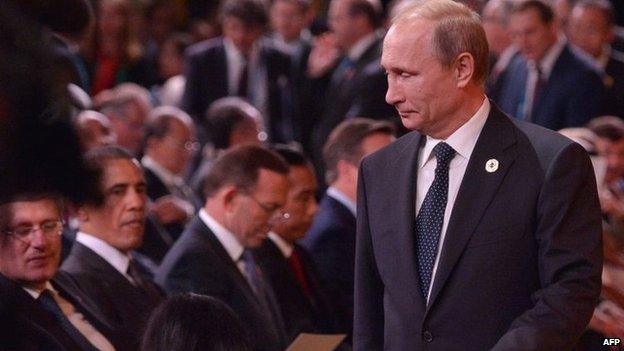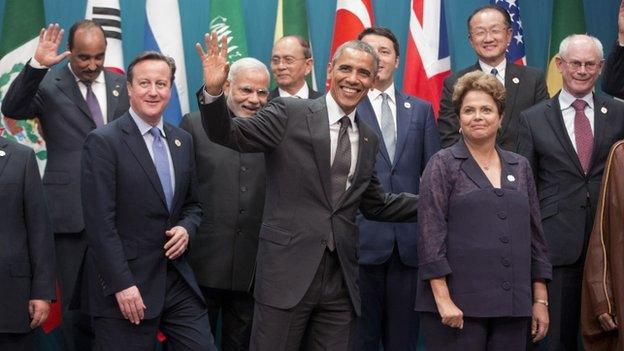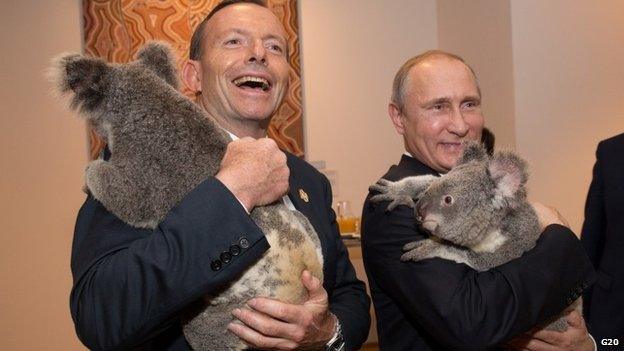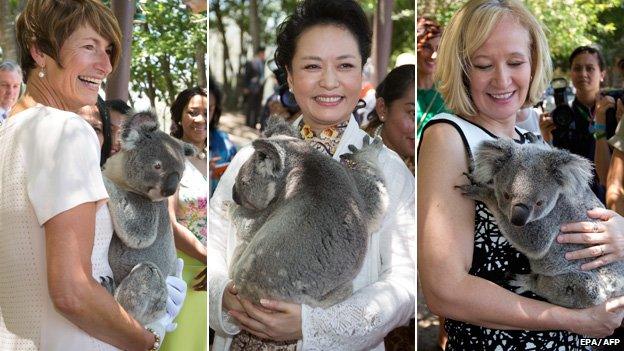G20 summit: Leaders pledge to grow their economies by 2.1%
- Published
Australian PM Tony Abbott: "It has been a weekend of achievement"
Australian Prime Minister Tony Abbott has closed the G20 summit by detailing economic pledges agreed by world leaders.
The leaders agreed to boost their economies by at least 2.1% by 2018, adding $2 trillion to global economies.
Much of the summit focused on Russian President Vladimir Putin's position on the crisis in Ukraine.
Mr Putin faced fierce criticism and left the meeting before it ended, but said the summit was "constructive".
Mr Putin said he was leaving before the release of the official communique, external, citing the long flight to home to Russia and the need for sleep.

President Putin faced a frosty reception from Western leaders at the G20 meeting
'Violating international law'
Australia, as host of the meeting, had sought to keep the focus on economic issues, but the issues of climate change and the conflict in Ukraine attracted significant attention.
US President Barack Obama met European leaders on Sunday to discuss a co-ordinated response to what they see as Russia's destabilisation of Ukraine.
Mr Obama told reporters Mr Putin was "violating international law, providing heavy arms to the separatists in Ukraine" and violating the Minsk agreement.
He said the "economic isolation" of Russia would continue unless Mr Putin changed course.
In a television interview on Saturday, Mr Putin called for an end to sanctions against Russia, saying they harmed the world economy as well as Russia.
The Kremlin denies sending military forces or heavy weapons to pro-Russia rebels in eastern Ukraine.
During the summit, Canadian Prime Minister Stephen Harper and British Prime Minister David Cameron also sharply criticised Mr Putin.
Millions of jobs

The G20 groups leaders from rich and emerging economies
World leaders agreed to plans drawn up by finance ministers from G20 countries in February, known as the Brisbane Action Plan, external, to boost their collective GDP growth by at least 2%.
This is a pretty ambitious target for many G20 economies that are struggling with recession or very little growth, says the BBC's James Landale from Brisbane.
In his speech, Mr Abbott said those reforms would create millions of jobs. He also outlined plans to increase the participation of women in the global workforce, and to crack down on tax avoidance by multi-national companies.
What is the point of the G20 summit? In 90 seconds
The statement also agreed to take strong, effective action on climate change, following pressure from the US and European leaders.
Mr Abbott had faced criticism from environmental campaigners for not including talks on climate change in the summit.
In other developments, President Obama met the leaders of Japan and Australia on the sidelines of the summit and they called for the peaceful resolution of maritime disputes in the South China Sea.
G20 leaders also released a statement in which they vowed to do all they could to "extinguish" the Ebola outbreak in West Africa.
It said that member states were committed to do what was necessary "to ensure the international effort can extinguish the outbreak and address its medium-term economic and humanitarian costs".

Koala diplomacy

Koala diplomacy? Australia's Tony Abbot and President Putin had this photo op, despite tensions

Some of the leaders' spouses cuddled up to koalas at a sanctuary in Brisbane
World leaders and their spouses were given koalas to hold on the fringes of the summit - the animals are native to Australia
First protected by law in the 1930s after being hunted to extinction by fur traders in parts of Australia; declared a threatened species in 2012
Species recently severely affected by chlamydia, which can cause blindness, infertility and death among the animals
Began being used as a diplomatic tool in early 1980s, after government lifts export ban - they are often given to foreign zoos as gifts
They are not bears, but are marsupials
